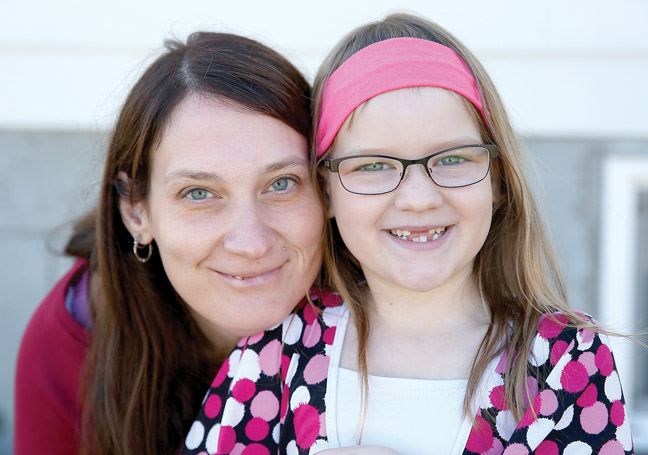Leslie Jackson learned the hard way that parents can't always know if their kids are well.
Five and rambunctious, her daughter Sydney lived, played and communicated like any other young kid. She was also legally blind in one eye.
"She never cocked her head, she didn't ever squint. There was nothing for me to ever guess that she had no vision in that eye. She watched TV normally, she read her books to me fluently."
When Sydney started kindergarten and took part in Northern Health's Health Day Circuit, Leslie scheduled an eye exam.
"I had never heard to go get an infant's eyes checked," she said.
She's like most Canadian parents. Only 14 per cent of kids going into Grade 1 have had an eye exam, according to the Canadian Association of Optometrists, and yet one in four school-age children has a vision problem.
In March when Leslie heard the diagnosis on that right eye she kept thinking: "What did I miss?"
Some things can only be caught in an exam, Sydney's optometrist Dr. Karen van Rensburg told Leslie. Symptoms aren't always obvious. Children are resilient. They adapt.
"That eye wasn't really working, her brain was switching it off because the image in front of that eye was out of focus," explained van Rensburg.
Sydney had a lazy eye, one of the more common cases for young kids.
"If you don't get a lens in front of that eye in that period then the brain will switch that eye off forever."
In a few short months, with the help of some "extraordinarily expensive" $800 glasses, Leslie can see the change in her daughter.
Plain glass covers Sydney's good eye and a high prescription, thick "Coke bottle" glass covers the other eye.
It's helped push Sydney, now six, to the point where she could legally pass a driver's exam.
There's still room for improvement, Leslie said.
"She gets patched two hours a day and has to do meticulous work, like dots to dots and colouring in the lines to train her poor eye to be able to see distinct lines," said Leslie, adding they're only one month into patching and about a year and a half away from when her eyesight will be set.
"It's a long process," for Sydney, who "hates patching with a passion."
"The hope is that she won't need glasses after that," Leslie said.
Van Rensburg said parents can get children's eyes checked as early as six months, where optometrists can use different cues other than the typical letter chart to see if development is good.
If nothing seems wrong and there's no family history of eye problems at an early age, then van Rensburg recommends parents bring children in from age three on.
"I find not a lot of parents are educated on the fact that MSP covers the eye exams and I think that puts a lot of people off," said van Rensburg, who along with Canadian Association of Optometrists have been stressing eye exams in October, which is Children's Vision Month.
"The majority of problems with eyes are fixable if it's picked up early on."
Most common afflictions are an eye turn, lazy eye or retinoblastoma - a small tumour inside the eye.
Watching patients like Sydney transform make for magical moments.
"The first time you put glasses on a child's eyes and they can see and you can see it in their face, that is the best feeling in the world," van Rensburg said.
Van Rensburg said she can't stress enough how important it is that eye tests become a routine check-up for parents.
"Everybody takes their children to the dentist. I'd love that same mindset (for eyes)."
Leslie's been taking that message to everyone who will listen.
"I think I'm driving my coworkers crazy," she said with a laugh.
"There's really no excuse for us not to be going in and having kids checked out," she said. "It's free and it takes 10 minutes."
"We should be taking advantage of it, not to wait and assume things are fine because your kid acts normally. Kids are going to adapt to what their normal is."



